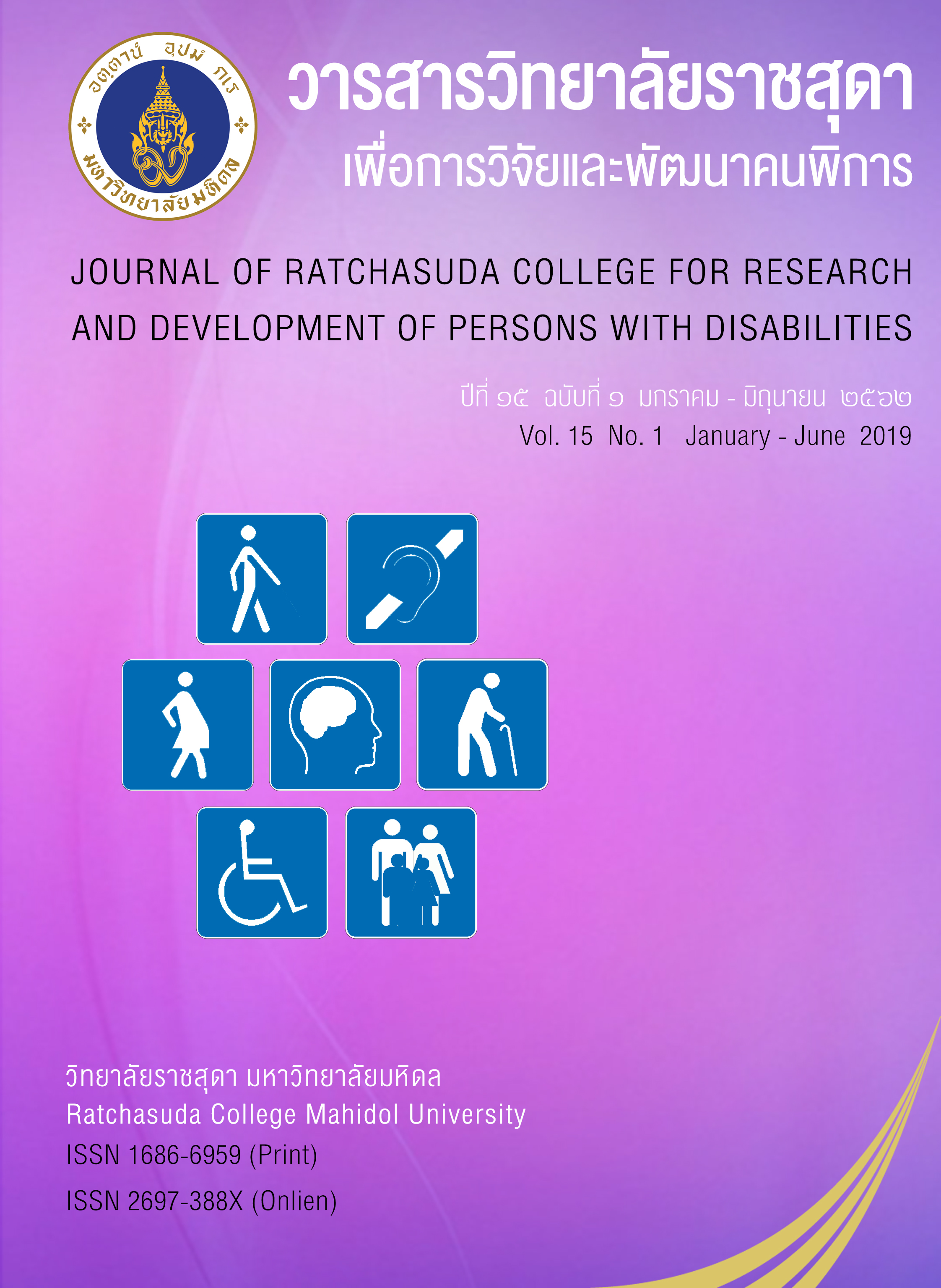Obstacles and success of the adjustment of people with disabilities
Keywords:
Obstacles, Success, Adjustment, People with disabilitiesAbstract
Living in the society of person with disabilities would face the satisfied and stressful Living in the society of person with disabilities would face the satisfied and stressful circumstances. Adjustment is the approach to decrease the stress, and to preserve the individual’s body, mind and social security. Adjustment aims to overcome the obstacles and to discover technique with lessen the pressure in order to live with a pleasant life.
Achieving adjusted person with disabilities have a secure mind and accept their impairments and help themselves according to their limitations to work and live without burden on their family and society. Obstacles of adjustment including their impairments, family, and environment. The successfulness of adjustment of person with disabilities can be considering to the overview of the mental health, self-help skills, vocational and social adaptations of those person. Achieving adjusted person with disabilities have a secure mind and accept their impairments and help themselves according to their limitations to work and live without burden on their family and society. Obstacles of adjustment including their impairments, family, and environment. The successfulness of adjustment of person with disabilities can be considering to the overview of the mental health, self-help skills, vocational and social adaptations of those person.
Downloads
References
Centre of Human Development and Person with Disabilities. (2009). Handbook of student with disabilities. Chiangmai: Author.
Chareansilp, D. (2009). Legal consciousness and the role of law in the life of disabled people. Chiangmai: Chiangmai University.
Chayapong, J. (2013). Independent Living: a case study of mobility disabled people driving independently in Bangkok. Academic Services Journal, 24 (4), 51-64.
Holroyd, E. E. (2003). Chinese cultural influences on parental caregiving obligations towards children with disabilities. Qualitative Health Research, 13(1), 4-19.
Japan International Cooperation Agency [JICA]. (2002). Country Profile on Disability, Kingdom of Thailand. Retrieved September 29, 2011, from http://siteresources.worldbank.org/
DISABILITY/Resources/Regions/East-AsiaPacific/JICA_Thailand1.pdf.
Kearney, T.A & Trull, C. J. (2012). Abnormal Psychology and Life: A Dimensional Approach. (3rd Edition). M.A. : Cengage Learning, 33.
Kowtrakul, S. (2013). Educational Psychology. (11th Edition). Bangkok: Chulalongkorn University Press.
Kudsee, W. (2009). Factors affecting the self-reliance of the disabled in tambon padaet Amphoe Mueang Chiang Mai. Chiangmai: Chiangmai University.
Namsiripongpan, W. (1996). Law and government policy towards people with disabilities. Bangkok: Winyuchon.
National Office for Empowerment of Persons with Disabilities. (2007). Handbook for design environment of person with disabilities and all ages. (11th Edition). Bangkok: National Office for Empowerment of Persons with Disabilities.
Niyomtham, S. (2001). Hearing Impairment: The Impact to Psychology Education and Society. (2nd Edition). Bangkok: RumThai Press.
Parnprecha, C. (2008). General psychology Unit 9th. (21st Edition). Nontaburi: Sukhothai Thammathirat Open University Printing house.
Prongsantia, S. (2014). The Comparison between Australia and Thailand about the management for people with disabilities. Bangkok: Office of the Higher Education Commission.
Ratrus, Spencer A., & Navid, Jeffrey S. (1980). Adjustment and growth: The challenges of life. N.Y.: Holt, Rinehart and Winston.
Sirithongthaworn, S. (2013). Higher Education concern people with disabilities. Special Education Journal, 8, 6.
Srion, J., & Tettim, J. (2002). A Study of holiday time behavior of the deaf living in Bangkok. Journal of Ratchasuda College for Research and Development of Persons with Disabilities, 1(1), 1-15.
Srisongkarm, W., Ratanasanya, S., Pothpattanapon, R., & Thepprasit, P (2006). General Psychology. Bangkok: Triple Group.
Sukbunpant, S., Arthur-Kelly, M., & Dempsey, I. (2013). Thai preschool teachers’ views about inclusive education for young children with disabilities. International Journal of Inclusive Education, 17(10), 1106-1118. doi: 10.1080/13603116.2012.741146
Sukhothaithamathirat Open University. (1991). Care of Handicapped. Nonthaburi: Sukhothaithamathirat Open University.
Sukphotharom, P., & Kesabutr, P. (2010). Adjustment by Defense Mechanisms. Executive_journal, 30 (4), 119-125.
Sungpreeda, W. (2014). Approach and the ways to promote career for graduates with disabilities. Bangkok: Office of the Higher Education Commission.
Suwanasang, K. (1990). Personality and adjustment. Bangkok: Bamrungsan.
Tanawatthana, M. (1996). Psychology to develop quality of life. Bangkok: Therapong Printing.
Tantipalachiwa, K. (2003). The Handout subject of taking care of people with disabilities Unit1-7. (2nd Edtion). Nontaburi: Sukhothai Thammathirat Open University Printing house.
Thirajit, V. (1994). Education for Children with Special Needs. (3rd Eds.). Bangkok: Chulalongkorn University.
Thongsoontorn, A. (2012). Attitude toward Working with Blind Employees at the Advance Infor Service (Public) Company Limited (Unpublished Master Thesis). National Institute of Development Administration, Bangkok.
Utthayotha, S. (2013). Inclusion for children with special needs in regular school. (10th Edition). Chiangmai: Darawan Printing.
Wongsawan, K. & Wongsawan, L. (2008). Mental Health. Bangkok: Ruamsan.
Downloads
Published
How to Cite
Issue
Section
License
บทความที่ได้รับการตีพิมพ์เป็นลิขสิทธิ์ของวารสารสถาบันราชสุดาเพื่อการวิจัยและพัฒนาคนพิการ






